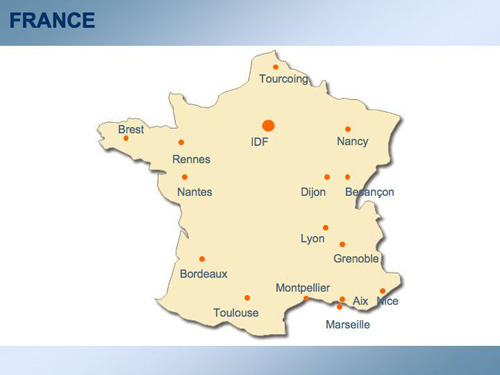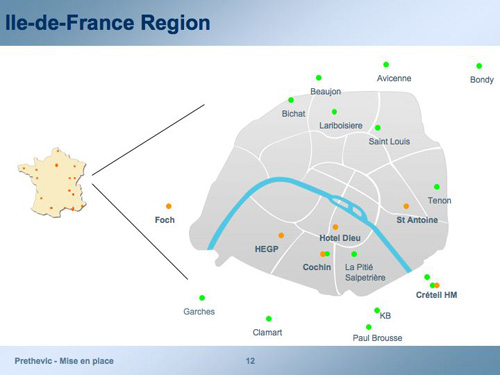
Sommaire
 Prospective, multicentre study of HIV/HCV co-infected patients following the first determination of decompensated cirrhosis or hepatocellular carcinoma
Prospective, multicentre study of HIV/HCV co-infected patients following the first determination of decompensated cirrhosis or hepatocellular carcinoma
The prognosis for HIV infection has been improved through the development of antiretroviral multiple drug therapies. Although HIV infection is now better controlled, an increasing number of HIV/HCV co-infected patients are reaching the terminal stage of their viral liver disease. HIV/HCV co-infected patients experience a more rapid rate of fibrosis progression than HCV infected patients. Moreover, the complications of cirrhosis appear at an earlier stage in the context of HIV/HCV co-infection.
Why PRETHEVIC?
Principal aim
To describe the outcome and patient management of HIV/HCV co-infected patients following the first determination of decompensated cirrhosis or hepatocellular carcinoma.
• What percentage of these patients will be placed on the organ transplant waiting list ?
• What are the reasons for the non-registration on a transplant waiting list of HIV/HCV co-infected patients at this stage in their disease?
• What percentage of these patients will undergo transplantation?
Secondary aim
1) Identification of indications for liver transplantation for HIV / HCV co-infected patients
- Which patients shoud be transplanted, and when ?
- Is the MELD Score adequate for HIV / HCV coinfected patients ?
2) Description of patients evolution after liver transplantation.
Methodology
During this prospective multicentre study, only patients with the following criteria are included:
- Aged 18 years or over.
- HIV positive serology.
- HCV positive serology.
- Hepatic cirrhosis (histology clinical arguments - biological - radiological - non-invasive techniques)
- Initial episode of clinical decompensation (ascites/digestive bleeding/hepato-renal syndrome/
encephalopathy/non-obstructive jaundice) or a diagnosis of hepatocellular carcinoma within the past year.
The patients are being followed using the methods generally agreed upon by all hepatologists, infectious disease specialists, internists and transplant surgeons. Clinical, biological, radiological and endoscopic data are collected every three months. A serum and plasma collection will be realized at the inclusion of the patient and subsequently once a year.
Where is PRETHEVIC implemented ?
PRETHEVIC is a French national study which involves 53 sites including different hospital departments specialised in infectious diseases, hepato-gastroenterology, clinical immunology or internal medicine.


News about PRETHEVIC
Inclusion graph

PRETHEVIC in the media
Newsletters
- Gazette n°24 - Oct 2012
- Gazette n°23 - Sept 2012
- Gazette n°22 - Juill-Août 2012
- Gazette n°21 - Juin 2012
- Gazette n°20 - Mai 2012
- Gazette n°19 - Avril 2012
- Gazette n°18 - Mars 2012
- Gazette n°17 - Février 2012
- Gazette n°16 - Janvier 2012
- Gazette n°15 - Nov. Déc. 2011
- Gazette n°14 - Octobre 2011
- Gazette n°13 - Septembre 2011
- Gazette n°12 - Août 2011
- Gazette n°11 - Juillet 2011
- Gazette n°10 - Juin 2011
- Gazette n°9 - Mai 2011
- Gazette n°8 - Avril 2011
- Gazette n°7 - Mars 2011
- Gazette n°6 - Février 2011
- Gazette n°5 - Janvier 2011
- Gazette n° 4 - Septembre 2010
- Gazette n°3 - Juin 2010
- Gazette n°2 - Mars 2010
- Gazette n°1 - Novembre 2009
Poster
Contact us
- Coordinating investigator : Dr Jean-Charles Duclos-Vallée
- Co-coordinating investigator : Dr Elina Teicher
- Co-coordinating investigator : Pr Daniel Vittecoq
- Project manager : Marita Ostos, Tel : 01 45 59 67 78, Fax : 01 45 50 67 91
- Clinical resarch associate : Laetitia Johnson Tel : 01 45 59 67 78, Fax : 01 45 50 67 91

